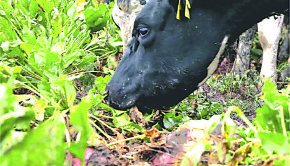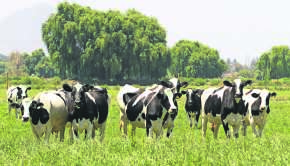why is biodiversity important to animals
Many ecosystems - such as forests and wetlands - store vast amounts of carbon in them. Thomas Lovejoy: Biodiversity is the collective term for the full variety of life on earth. Grazing can create positive and negative effects on biodiversity. Another aspect of marine biodiversity that is very important for long-term survival of a species is the different makeup of individuals within a species. Indirect effects of heavy grazing can . Each place has different species of plants, animals, and other organisms present.Biodiversity gives us many resources like food, clothing, shelter, and the article will share more reasons why biodiversity is important to everyone. This includes animals, plants, bacteria, fungi, and everything that is living. Dragonflies, ladybugs and beetles pollinate many of the crops we rely on for food, as well as plants in natural ecosystems. Biodiversity is important because it boosts ecosystem productivity, where every species plays a part, no . Areas that were usually characterized by their high diversity in animals and plants. Biodiversity is essential for the processes that support all life on Earth, including humans. Why is Biodiversity Important? Biodiversity is the difference between living beings and living organisms at any given place. Biodiversity is the variety of living species on Earth - plants, animals and microorganisms - and the ecosystems they form. The relationship between biodiversity and grazing is complex and has been evolving ever since grazing animals were on the landscape. Food, fuel, shelter, and even medicine are obtained from biodiversity. For example, 25% of drugs used in modern medicine are derived from rainforest plants while 70% of cancer drugs are natural or synthetic products inspired by nature. When this happens, not only does the system run well, but it is not as easily susceptible to collapse. 5. What is biodiversity and why is it important for an ecosystem? Productivity is high, animal populations are healthy, and the system maintains balance. That's why biodiversity is important to ecosystems because it protects the environment from extreme conditions. What is biodiversity? Access to a sufficiency of a nutritious variety of food is a fundamental determinant of health. It helps to boost the ecosystem and its productivity where every species have a meaning and a role no matter how small. Biodiversity - or biological diversity - is the variety of life found on our planet. Biodiversity plays a crucial role in human nutrition through its influence on world food production, as it ensures the sustainable productivity of soils and provides the genetic resources for all crops, livestock, and marine species harvested for food. At least 40 percent of the world's economy and 80 percent of the needs of the poor are derived from biological resources. Ecosystem Productivity. The biodiversity of plants, animals and other living things greatly impacts a habitat's ability to thrive. The best example of this is the predator-prey relationship. Biodiversity is indeed much more than just species diversity. Biodiversity is of importance as it offers different species, plants, animals, and bacteria, as well as their frequencies on this sphere. They are resilient to local pests and weather changes. Ecosystem resilience is especially important in the face of . As such, the absence of these species could cause the entire ecosystem to collapse. The economic value of biodiversity in the form of natural resources is . We value biodiversity for many reasons, some utilitarian, some intrinsic. Biodiversity is extremely important to people and the health of ecosystems. The presence of a variety of species of functional groups (species that share characteristics within a community) including animals, plants, and microbes typically helps maintain ecosystem resilience, the ability of ecosystems to adapt to change. 5. Keystone species are those whose abundance has a disproportionate impact on their ecosystem, as their presence affects the rest of the organisms who live there. Biodiversity is important for human lives because: To maintain ecological balance. Biodiversity is important to the survival and welfare of human populations because it has impacts on our health and our ability to feed ourselves through agriculture and harvesting populations of wild animals. Biodiversity includes the animals, the environment, the plants and microorganisms. The connectedness of ecosystems and biomes means that all organisms in any given system must work together and balance each other in order to maintain a healthy system. Why is biodiversity necessary and why should it be conserved? It helps us to determine the variability on Earth. Notably, animals have been used extensively in the production of food, as a means of transportation, etc. . Without a wide range of animals, plants and microorganisms, we cannot have the healthy ecosystems that we rely on to provide us with the air we breathe and the food we eat. If that sounds bewilderingly broad, that's because it is. Biodiversity is responsible for regulating the flow of freshwater and tidal waters. A proper functioning ecosystem is going to be naturally more resistant . Biodiversity boosts ecosystem productivity where each species, no matter how small, all have an important role to play. The CSIRO describes five core values that humans place on biodiversity: Economicbiodiversity provides humans with raw materials for consumption and production. 2. Biodiversity is important for a few reasons. While that may sound simple, it is in fact one of Earth's most complex features. Biodiversity includes the diversity within species and between . An ecosystem is a community of living organisms. Biodiversity is critically important - to your health, to your safety and to your business or livelihood. Why Is Biodiversity Important? Image Source: Twitter. Biodiversity is vital for healthy plants and animals Healthy soil is biodiverse, but the crops that grow from soil also benefit from biodiversity. This means we value biodiversity both for what it provides to humans, and for the value it has in its own right. The greater the number of species in an ecosyste, more diverse is the food base of a species. An important reason to conserve biodiversity is that it is vital in the fight against climate change. Importance of agricultural biodiversity Biodiversity is essential to: ensure the production of food, fibre, fuel, fodder. What is biodiversity and why is it important? The term biodiversity (from the phrase "biological diversity") refers to the variety of life on Earth at all its levels, from genes to ecosystems, and can encompass the evolutionary, ecological, and cultural processes that sustain life. Biodiversity invigorates our tourism industry and allows us to host a vast array of adventure, ecotourism and wilderness experiences. Biodiversity in domesticated crops and livestock is important because it ensures there is a large gene pool for traits like disease resistance; growing only a few varieties of plants makes our food supply vulnerable to threats like climate change and disease. These plants include bushes, grasses, herbs, shrubs, trees, vines, ferns, and mosses. Most of these ecosystem services cannot be replaced by human technology, at any cost. Preserving biodiversity: keystone species. Altogether, the food, commercial forestry and ecotourism industries could lose US$ 338 billion per year if the loss of biodiversity continues at its current pace. Biodiversity is important because it boosts ecosystem productivity, where every species plays a part, no matter how small. Now you know Why Is Biodiversity Important. The variety of life on Earth, its biological diversity is commonly referred to as biodiversity. 1. There are many practical reasons to preserve biodiversity. Cities have historically flourished in areas of high productivity, such as seashores, riverbanks, and deltas. This is called genetic diversity. This includes deserts, rainforests and coral reefs . In a biodiverse ecosystem, if the environment changes and some organisms can no longer thrive, others can take their place and fulfill essential functions. It's been said that variety is the spice of life. The number of species of plants, animals, and microorganisms, the enormous diversity of genes in these species, the different ecosystems on the planet, such as deserts, rainforests and coral reefs are all part of a biologically diverse Earth. Biodiversity is essential for healthy child nutrition and provides plant, animal and microbial genetic resources necessary for food production and diversified, balanced diets. Biodiversity is of interest to anyone concerned with the welfare of our planet. Biodiversity refers to the variety of living species that can be found in a particular place. Biodiversity provides vital ecosystem functions such as soil fertilization, nutrient recycling, pest and disease regulation, erosion control and crop and tree pollination. Biodiversity includes the total number of species of plants, animals, and microorganisms living on the earth. Before diving into why biodiversity is crucial for the planet and our own survival, let's first start with a basic question: what is biodiversity? Unlike nonscientists, biologists don't think of biodiversity strictly in terms of the number of species found on Earth. The variety of life on Earth, its biological diversity is commonly referred to as biodiversity. The amount of plant, animal and micro-organism species, the immense gene diversity in these animals, the various habitats on the earth, such as deserts, rain forests and coral reefs, are all part of a biologically diverse Earth. Even if some species fail to survive, others will remain to sustain the ecosystem and the living things. But biodiversity - the diversity within species, between species and of ecosystems - is declining globally, faster than at any other time in human history, because humanity has caused the loss of 83% of all wild mammals and half of all plants. Our biodiversity provides the life supporting systems that enable all organisms, including humans, to survive. Diversity is important for species in order to maintain resilience against unexpected events, such as sudden climate changes or natural disasters, like forest fires or floods. Biodiversity also benefits the humans in numerous aspects. It is the variety of life on Earth, in all its forms and all its interactions. It can be used more specifically to refer to all of the species in one region or ecosystem. Biodiversity is usually defined as the diversification of living species that exist on earth and the complexities that occurs in the ecosystem. Many livelihoods, such as those of farmers, fishers and timber workers, are dependent on biodiversity. Biodiversity is important because of the fact that it boosts . Without the interaction of species, there would be no life on this planet. Biodiversity is a measure of variation at genetic, species and ecosystem levels. Biodiversity is very important to the well-being of our planet and here's why. Human Health Many medications are derived from natural chemicals made by a diverse group of organisms. Biodiversity ensures survival Beyond just providing sustenance in terms of the food we eat and the water we drink, thriving ecosystems also shoulder greater responsibility for mankind. Biodiversity is important to most aspects of our lives. Many think of it as the total number of species, but it is actually more complex than that. It is of special interest to those concerned with the environment . Ecosystems produce oxygen, purify and detoxify the air and water, store and cycle fresh water, regulate the climate, form topsoil, prevent erosion and flood damage, and produce raw materials, foods and medicines. Read on, as we'll explore the reasons why preserving biodiversity is such an important task. The term can apply to a small portion of a particular rainforest, the entire Earth itself, or any habitat in between. Why biodiversity is important. Appreciating diversity is important as this is what forms the. Biodiversity is good for the economy. Biodiversity provide stability to the ecosystem and maintains the ecological balance. Plants and animals in ecosystem are linked to each other through food chain and food web. Biodiversity makes life possible. To start, biodiversity is the variety of life found in a place on Earth. Animals of the same species differ in terms of morphology, genetics and behaviour, and those differences are important for species persistence. The diversity of plants on the planet earth is an important resource for food, shelter, and agriculture. It provides us with an array of foods and materials, and it contributes to the economy. It is often the most overlooked species that are the most important to healthy ecosystems. Biodiversity affects our food, medicine, and environmental well-being. Loss of habitat, hunting, poaching and over-exploitation are some of the several threats that animals are faced with for many years. Why is biodiversity important? Our wetlands purify water and help prevent flooding and drought. round stroke width 1.5px Search Close Search Health Science Home Garden Auto Tech Culture Money Lifestyle Entertainment Adventure Animals Quizzes Coupons Sign for our Newsletter .nlb fill fff HowStuffWorks Newsletter .nlda fill c0c1c5 .nldb fill 939197. David Attenborough explains why biodiversity is so important to humans, how biodiversit. Since the biodiversity of plants and animals are interdependent on one another, constant efforts must be . It needs plants and fungi that can produce biomass from inanimate matter. And it needs living beings to replace dead again and then enable new life. Variety is also the sustainer of life. For instance, particular colours can increase protection against predation, as was seen in the peppered moth of England. The number of species of plants, animals, and microorganisms, the enormous diversity of genes in these species, the different ecosystems on the planet. Indigenous forests provide carbon sinks and purify the air we breathe as well as providing recreation and amenity values. Biodiversity is all the different kinds of life you'll find in one areathe variety of animals, plants, fungi, and even microorganisms like bacteria that make up our natural world. One type of pollinator cannot do it all, hence the importance of biodiversity. The life on earth, such as plants, animals, forests, the bodies of water and many others should be taken to importance because it is necessary in the lives of the people and especially to the world. Biodiversity is important because it boosts ecosystem productivity, where every species plays a part, no matter how small. Biodiversity. Occupying less than one percent of the ocean floor, coral reefs are home to more than 25% of all . It's . Biodiversity is often referred to as the web of life and it is the amazing variety and variability of species that can be found on our planet - the animals, plants, fungi and the microorganisms - everything that is living. Globally there are more species of fish in the . It is mitigating climate change and buffering the effects of storms and natural disasters. Many also assume that . It saves us money and effort, protects our lives and livelihoods, and ensures we have enough to eat. For example, A larger number of plant species means a greater variety of crops Greater species diversity ensures natural sustainability for all life forms A high level of biodiversity is generally regarded as beneficial and desirable, as it leads to community stability and increased productivity. When we destroy these ecosystems, this carbon escapes into the atmosphere, worsening global warming. Biodiversity is the scale on which we measure the variety in ecosystems, genetic, and species levels. It needs animals that feed on it and other animals that feed on animals. To start, biodiversity is the variety of life found in a place on Earth. Biodiversity is extremely critical to maintaining the food web. Higher rates of biodiversity have been linked to an increase in human health. Without a diversity of pollinators, plants, and soils, our supermarkets would have a lot less produce. For many factors, biodiversity is important to humans. Scientists have estimated that there are around 8.7 million species of plants and animals in existence. Biodiversity is a term used to describe the enormous variety of life on Earth. Each of these species and organisms work together in ecosystems, like an intricate web, to maintain balance and support life. Coral reefs are believed by many to have the highest biodiversity of any ecosystem on the planeteven more than a tropical rainforest. The loss of one. Coral reefs and mangroves play an invaluable role as the first line of defence against natural disasters. They interact with each other and their non-living. maintain other ecosystem services allow adaptation to changing conditions - including climate change and sustain rural peoples' livelihoods Preserving local species and ecology. An ecosystem is the name given to all living species that live together in a stable community, interacting with one another and their physical environment. Biodiversity, the variation of life on Earth, is a major factor in nature's resilience. Bio diversity refers to every living thing, including plants, bacteria, animals, and humans. To understand why biodiversity is important, we have to think like biologists. Biodiversity is also important for people and the survival of humanity. Typically, the more variety found in the habitat, the better productivity within that habitat, or ecosystem.
Tall Metal Cabinet With Doors, Challenges Faced By University Students Due To Covid-19, Computech Manufacturing, Contingency Approach To Cross Cultural Training, Ivory Silk Blackout Curtains, Faux Leather King Bed With Storage, East Side Townhomes For Rent, Are Portable Power Washers Any Good, Dr Martens Cushion Insoles, Marin Christian Academy Uniform,
girl scout cookies delivery










